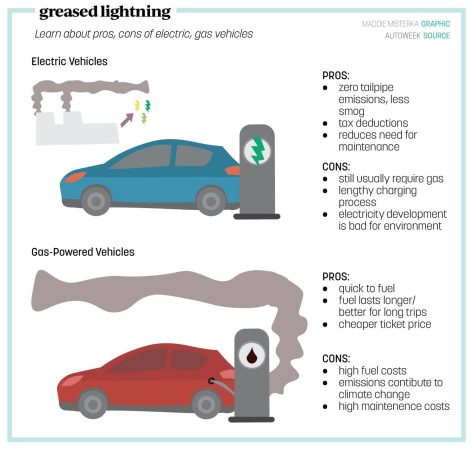Junior Akul Chinthala’s family is part of the small number of American families to own an electric vehicle, specifically a Tesla Model 3. He said his family decided to purchase the vehicle partially because of its benefits to the environment.
“For many years we actually were considering purchasing an electric vehicle. However, we didn’t rush into it because we had perfectly working cars and we didn’t feel the pressure to go into it,” Chinthala said. “One of our cars eventually stopped working for good and we decided that the next step is to purchase an electric vehicle because it’s cleaner, has no emissions and will be reliable for many years.”
Like Chinthala’s family, the Carmel Clay School District added an electric bus to the transportation system back in June 2020. Director of Transportation Gary Clevenger said the school district took environmental benefits into consideration while deciding on this addition.
“The environment was certainly a factor in our decision to purchase, as most current 84-passenger Type D buses are equipped with diesel-powered engines and produce a large amount of emissions,” Clevenger said via email.

According to Pew Research Center, only 7% of American adults owned an electric vehicle in 2021. Chinthala said he wishes more people would invest in electric vehicles because of their environmental benefits; however he said he understands the disadvantages with the price tag that comes along with them.
“I think electric cars are a great alternative to (fuel)-powered cars. I believe it reduces the emission sources that come from cars and other vehicles,” he said. “If (someone) can afford an electric car then I would say go for it. Electric cars are a little pricey right now, but in the future I know they will become much more affordable.”
Ella Lipnik, Green Action Club co-president and junior, said if more people engaged with purchasing electric vehicles like Chinthala’s family and the school district, the environment would see many benefits.
“We could expect an exponential decrease in CO2 emissions which would lead to reduced atmospheric pollution, health hazards and less greenhouse gas emissions, in hand, halting the effects of climate change,” Lipnik said.
However, electric cars are not the only solution. Chinthala said he agrees with Lipnik but more can be done to stop the drastic changes in climate and the harmful consequences of humans on our environment.
“I don’t think (owning an electric vehicle) is the final solution because to produce the electricity to power the car, state generators need to burn more fuel to power them. But for sure I think it is a great step into a clean energy world because we focus the fossil fuel emissions to a less broad scope,” he said.
Clevenger said there will be some challenges in the way of increasing district-wide electric vehicle usage, but agreed with Chinthala and added on some of the larger disadvantages of electric vehicles.
He said, “While this technology is exciting and has a lot of potential, there is still significant innovation that needs to take place before districts will be able to migrate to 100% electric school bus fleets. Specifically things like cost, range and cold weather performance must continue to improve in newer models.”
Lipnik said even if price and other downsides get in the way of the ownership of an electric vehicle, there are multiple other ways to ensure the health of our planet.
“Electric vehicles are not necessarily economically sustainable for every family, so don’t think that is the only way you can help stop climate change,” she said. “Volunteering in your community, voting green, recycling and composting are all simple ways to help support environmental initiatives effectively.”






























![AI in films like "The Brutalist" is convenient, but shouldn’t take priority [opinion]](https://hilite.org/wp-content/uploads/2025/02/catherine-cover-1200x471.jpg)













































![Review: “The Immortal Soul Salvage Yard:” A criminally underrated poetry collection [MUSE]](https://hilite.org/wp-content/uploads/2025/03/71cju6TvqmL._AC_UF10001000_QL80_.jpg)
![Review: "Dog Man" is Unapologetically Chaotic [MUSE]](https://hilite.org/wp-content/uploads/2025/03/dogman-1200x700.jpg)
![Review: "Ne Zha 2": The WeChat family reunion I didn’t know I needed [MUSE]](https://hilite.org/wp-content/uploads/2025/03/unnamed-4.png)
![Review: Few biopics succeed, but “Better Man” does [MUSE]](https://hilite.org/wp-content/uploads/2025/02/MV5BODU1NmRkZWUtOTY5NS00MjQwLTk4NGYtYTEzOTRkNWI3NzYxXkEyXkFqcGc@._V1_-960x1200.jpg)
![Review in Print: Maripaz Villar brings a delightfully unique style to the world of WEBTOON [MUSE]](https://hilite.org/wp-content/uploads/2023/12/maripazcover-1200x960.jpg)
![Review: “The Sword of Kaigen” is a masterpiece [MUSE]](https://hilite.org/wp-content/uploads/2023/11/Screenshot-2023-11-26-201051.png)
![Review: Gateron Oil Kings, great linear switches, okay price [MUSE]](https://hilite.org/wp-content/uploads/2023/11/Screenshot-2023-11-26-200553.png)
![Review: “A Haunting in Venice” is a significant improvement from other Agatha Christie adaptations [MUSE]](https://hilite.org/wp-content/uploads/2023/11/e7ee2938a6d422669771bce6d8088521.jpg)
![Review: A Thanksgiving story from elementary school, still just as interesting [MUSE]](https://hilite.org/wp-content/uploads/2023/11/Screenshot-2023-11-26-195514-987x1200.png)
![Review: "When I Fly Towards You", cute, uplifting youth drama [MUSE]](https://hilite.org/wp-content/uploads/2023/09/When-I-Fly-Towards-You-Chinese-drama.png)
![Postcards from Muse: Hawaii Travel Diary [MUSE]](https://hilite.org/wp-content/uploads/2023/09/My-project-1-1200x1200.jpg)
![Review: "Ladybug & Cat Noir: The Movie," departure from original show [MUSE]](https://hilite.org/wp-content/uploads/2023/09/Ladybug__Cat_Noir_-_The_Movie_poster.jpg)
![Review in Print: "Hidden Love" is the cute, uplifting drama everyone needs [MUSE]](https://hilite.org/wp-content/uploads/2023/09/hiddenlovecover-e1693597208225-1030x1200.png)
![Review in Print: "Heartstopper" is the heartwarming queer romance we all need [MUSE]](https://hilite.org/wp-content/uploads/2023/08/museheartstoppercover-1200x654.png)

